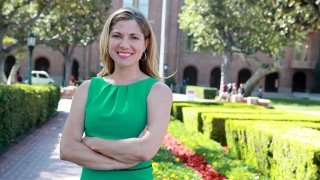USC Rossier Assistant Professor Julie Posselt has had a nearly lifelong fascination with educational equity. She grew up in a small town in Wisconsin, where her parents instilled in her an awareness of the challenges facing educators working with low-income students.
Since joining the USC Rossier faculty last year, she has been advancing her research into the graduate admissions process and how universities and disciplinary societies can increase the diversity of graduate students, particularly in the sciences.
The timing is right because many universities are realizing that heavy reliance on test scores limits both the applicant pools and who is ultimately admitted. Female students and students of color might not typically perform quite as well as white males on standardized tests such as the GRE, Posselt says, but many of them display the necessary ambition and determination to succeed in graduate study.
“There are more and more schools and graduate programs that recognize we need to think more expansively about who has potential, and they’re re-evaluating admissions practices,” she says. “By thinking beyond test scores when making the first cut of applicants, you’re less likely to lose students from under-represented backgrounds.”
WHITE MALES HAVE THE EDGE
As an undergraduate at the University of Wisconsin, Posselt majored in education and history, with a minor in political science. After receiving her master’s in educational policy studies at Wisconsin, she became the assistant director of the McNair Scholars Program at the University of Northern Colorado. McNair is a federally funded program that helps facilitate the transition to graduate school for students from typically underrepresented groups. During this time, she started researching access to graduate education.
She moved on to the University of Michigan, where she focused on higher education as a doctoral candidate. She started her faculty career in 2013 at Michigan, where she wrote Inside Graduate Admissions: Merit, Diversity, and Faculty Gatekeeping (Harvard University Press, 2016).
The book received high marks from reviewers, with one calling it “a deep and compelling take on graduate admissions.” It presents graduate admissions from the point of view of professors and others who decide which students get in. Typically, Posselt found, the professors genuinely thought that they were selecting graduate students based on merit, and they seldom talked openly about race. Yet, especially when filtering the initial pool of applications, they relied on criteria that tipped the scales in favor of the usual suspects — white, well-educated males.
COACHING FACULTY TO BE MORE INCLUSIVE
Posselt is now conducting research in two areas — one student-based and one program- and faculty-based. Through a National Academy of Education/Spencer Foundation postdoctoral fellowship, she is preparing the first national analysis of equity and student well-being in graduate education.
She also is a co-principal investigator on three different grants from the National Science Foundation. One is aimed at increasing the numbers of women and members of ethnic and racial minorities in graduate physics programs. The two-year study — known as IGEN, or Inclusive Graduate Education Network — is funded by a $300,000 grant from National Science Foundation INCLUDES (or Inclusion across the Nation of Communities of Learners of Underrepresented Discoverers in Engineering and Science). IGEN was one of 37 pilot grants funded in the first round of the NSF INCLUDES program.
Posselt coordinates and leads the project’s research agenda. She also has helped to develop and facilitate workshops to coach faculty members of graduate physics programs on ways to make their recruitment and admissions practices more inclusive. In some cases, that might require them to reach beyond the small networks of colleges and universities that have impressed them in years past. In other situations, professors are learning how to take a more systematic, holistic approach to reviewing applications.
“Working at the level of the discipline is a unique opportunity,” Posselt says. “By creating a network of physics PhD programs that are all dedicated to more inclusive practices, IGEN wants to change what professors in the field think of as normal ways to recruit, admit and mentor students.”
Overseeing the grant is Monica Plisch, director of education and diversity for the American Physical Society, a nonprofit membership organization working to advance the knowledge of physics.
Among all PhD fields in the United States, physics programs award the smallest percentages of slots to women (19% on average) and members of underrepresented ethnic and racial minorities (7%), according to the American Physical Society. Those proportions are well below the groups’ much larger representations in the general population.
At the end of the pilot period, Posselt and members of the IGEN team will have the opportunity to apply for an alliance-level grant. That could involve partnering with other NSF INCLUDES grant recipients on a much larger, longer-term project.
Posselt said she enjoys working with physicists as a community of scholars. “Physicists care about precision in ways that social scientists do not always,” she says. “There’s elegance in the way they communicate their ideas. They care very much about fundamentals. I appreciate that.”





